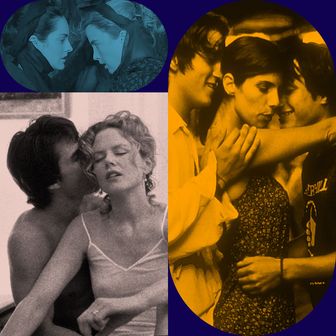
Last Sunday, on our 23rd anniversary, I asked my husband to marry me again. This was not romantic. This was triage, a dose up the nose of marital Narcan. The night before, Dan had smacked closed his laptop, on which we were watching that tender, electric meet-cute scene in season two of The Bear. “Wait,” he said. “Do you think we’re going to be sitting on this couch watching Netflix until we die? Like, for the next 35 years?”
I said “yes.”
In 2000, when we got married, we had two rules: No cheating and no dying. Back then, nobody talked about ethical nonmonogamy, just as nobody talked about gluten. On your wedding day, you just put on your fancy clothes, took (took?) your lover as your spouse, and walked away betrothed. The plan from there was … no plan, really. Go to a hotel once in a while? Try not to destroy each other? Good luck!
The no-plan plan works well enough at first. Probably because when you are newly married, you’re not really married anyway. You’ve promised to fuse your lives, but you haven’t done it yet, so everything is floaty and roomy and easily forgiven.
Year two of our marriage: Dan gave me a not-campy, not-kinky feather duster for my birthday because he’d noticed that I cleaned. (Yes.) I also got Windex. We did not get divorced.
Then we had a kid and another kid, a dog and another dog, two cats, a mortgage, miscarriages, foot surgery, melanoma, tax bills, black mold. Marriage working “well enough” began to seem like an idiotically low bar, almost a form of self-harm for a compact we’d (1) staked our sexual-economic-procreative lives on and (2) committed to forever.
So I bought a stack of books, looking for a relationship guru, hoping to find someone to tell me not just how to survive marriage but love it here and thrive. Let me save you a lot of time: Don’t do this. There’s little that’s uplifting in these texts. The general view seems to be if you work very, very, very hard — if you make yourself less unruly; if you sand down enough of your weird human edges — you can fix yourself/your spouse/your relationship and make lifelong pair-bonding tolerable.
I will never get over reading Intimate Terrorism, by Michael Vincent Miller. In it, he describes marriage as “a barbaric competition over whose needs get met,” “two people trying to make a go of it on emotional and psychological supplies that are only sufficient for one.” Relationship granddaddy John M. Gottman, in The Seven Principles for Making Marriage Work: A Practical Guide From the Country’s Foremost Relationship Expert, did not make me feel better either. After extensive research in his Seattle Love Lab, Gottman discovered what he calls the Four Horsemen of the Marriage Apocalypse: criticism, contempt, defensiveness, and stonewalling. Are you fucking kidding me? Just root those out forever?
Then I found Esther Perel.
Maybe you have too? Perel’s blockbuster podcast Where Should We Begin?, which launched in 2017, moves to the Vox Media Podcast Network this month. Each episode features a couple sitting for a three-hour session in Perel’s therapy office, sharing the raw details of their relationship — the sex they’re not having, the resentment they feel, the conversations they have with each other in their heads but are too scared to voice out loud. Plus she offers useful tips. “Lay down on the floor, both of you,” she tells one couple who have married, divorced, and married each other again and who, as ever, argue nonstop.
Husband: “Lay down on it?”
Perel: “Lay down next to each other. Now try to have a fight.”
The couple lie down on the floor. They both start laughing.
Wife: “I don’t think I can.”
Husband: “This is weird.”
Perel: “I said a fight!”
Husband: “We’re trying.”
Perel: “You see, it’s very hard … The bodies won’t let you. A fighting body cannot lie flat … So when you go and you escalate, lay down, even when your kids are in the room, because you’ll start to laugh and you’ll tell them, ‘That shrink we met gave us this bizarre piece of research.’ It will calm everybody.”
Still, Perel herself is the draw. She’s a magnet: that European woman at the dinner party with whom everybody falls in love; a 64-year-old psychotherapist who favors silk camisoles and dangling necklaces; who speaks nine languages, including her Belgian-accented English; the daughter of two Polish Jews who survived the Nazi death camps — the only people in either of their families to do so. You can see in her eyes and hear in her voice that she understands there are whole galaxies of emotional real estate between not being dead and living. She’s not interested in healing that’s built upon people trying to become tamer or lesser or smaller. She wants you to own all of yourself, including the ambivalences and contradictions. You know, the ones you’ve tried to resolve by projecting onto your spouse — and then disagreeing with them.
“What’s her secret?” I asked my therapist best friend. Why are we all so drawn to her?
“She believes you can survive anything, if you want to survive. Just take her hand.”
Perel’s first book, Mating in Captivity: Unlocking Erotic Intelligence, came out in 2006. The cover features a black loafer mounting a red kitten heel (which sounds terrible but actually works), and the jacket copy, all styled in flirty lowercase lettering, just comes out and asks the question few in the marriage-industrial complex want to ask: Can this ever work? “Can we desire what we already have?”
I read Mating in Captivity in bed, which Dan did not find comforting. To which I could hear Perel saying Frenchily, Good! Comfort is overrated. Comfort is a trap. Comfort is a box we create and lock ourselves in — and then complain is claustrophobic. Comfort is (horror of horrors to Perel) “a flannel nightgown.”
“In truth, we never know our partner as well as we think we do,” Perel wrote. I underlined this in red. What if Dan didn’t go surfing for three hours and then shower at his buddy’s beach house? What if I was just blind to what I didn’t want to see? “We narrow down our partner, ignoring or rejecting essential parts when they threaten the established order of our coupledom.” I underlined that, too. I’d put my heart, my money, my children, my body, my whole world in this one man’s hands. I’d made the utterly conventional (yet weirdly extreme) play of putting all my eggs in one basket and then watching that basket. Dan needed to be predictable for my sanity. Had I edited him to be that way?
I found that idea thrilling.
(Perel is a big proponent of playing mind games with yourself. She writes in Mating about counseling a couple whose sex life has simmered down to cuddling: “‘Do you touch each other?’ I asked, though I already knew the answer. ‘All the time,’ the wife replied. ‘Well, it’s got to stop.’”)
Years passed. We threw out our backs. We watched all of Éric Rohmer’s films (sexy) and then all of Breaking Bad (not). I criticized and I stonewalled and I forgot about the Gottmans. I got boring, pruning myself into the person I thought my family needed me to be. Dan got boring too. Every morning, he’d put on one of his four identical pairs of Levi’s and grind his 27 — always 27 — grams of coffee beans in our same dumb broken grinder. Occasionally, I’d catch myself in my sweatpants at 6:30 p.m. (this was before the pandemic) and think about Perel. I agreed with her in theory: I needed to become bigger and more wild. I agreed with her that eroticism — in all its irrational, inefficient grandeur — is the antidote to death. Sometimes, in my sweatpants, I’d think about Perel, how she was right, and I’d hate her for it, just as I hated a woman in my running group who used to say that when she got tired of her pace, she tried going faster.
In 2017, Perel published her second book, The State of Affairs: Rethinking Infidelity. In it, she pushed further her core idea: the answer to an enduring marriage is not perfect intimacy. It’s not a wholesale merger. People need separateness. People need mystery. People need to feel recklessness — and recklessness, Perel is sorry to say, is tamped down by caregiving, which is what you’re doing year after year with your spouse.
One of her most appealing ideas is that while an affair is a bomb that ends your relationship, the detonation can be the chance to start a new one. With the same person.
If consulted, she would have made us rewrite our marriage rules: No cheating unless you’re dying.
No cheating unless you’re on year three of your flannel nightgown.
It’s been a long few years for everybody. One of my biggest regrets is how much of it I spent in emotional flannel. I thought if I could just retreat far enough inside myself, if I could just be less — if I could just live out a marital version of Ottessa Moshfegh’s My Year of Rest and Relaxation: “My emotions passing like headlights that shine softly through a window …, then fade and leave me in the dark again” — I’d emerge renewed.
To state the obvious, I lost track of Perel.
Marriage is a stupid institution. All the pieces don’t fit.
It’s easy to tell yourself, amid the dogs and the taxes, that you can’t shake your union, that you’ve got to bury what’s causing bumps. It’s easy to outsource onto your partner all the ways you’ve failed: You got boring. You let us get here.
Then you’ll find yourself, two-plus decades in, sitting on the couch in the room where you raised your children, shocked awake by witnessing TV characters falling in love.
At that point, you’ll have a choice. You can seek out other people. (Hello, Bill de Blasio and Chirlane McCray!) You can get divorced.
Or you can buck up and take Perel’s hand. Exhume all your buried parts. Pray they haven’t rotted. Believe in survival.
You can acknowledge to your Levi’s-wearing partner, who is still very handsome, if more distinguished, that after 23 years you’ve run yourself into an emotional cul-de-sac, a safe, well-paved suburb where neither of you ever wanted to live.
“We can’t do this until we die,” I said to Dan.
He said, “I KNOW.”
We all live in Perel’s world now. It’s sparkly here and messy, a dirt road through the mountains with dazzling, fleeting wildflowers and old majestic Jeffrey pines, burned by lightning, gnarled by time, their branches twisted and more graceful than any sapling’s.
What I want now — in my life, in my marriage — is to reclaim fullness, not backtrack into youth.
“Are you sure you still want to do this together?” Dan asked.
“I do.”
More From Esther Perel's Universe
- Esther Perel’s Advice for Giving Advice (and Hosting Dinner Parties)
- The Complete Esther Perel Immersion Course
- Which Episode of Where Should We Begin? Should You Listen to Right Now?













